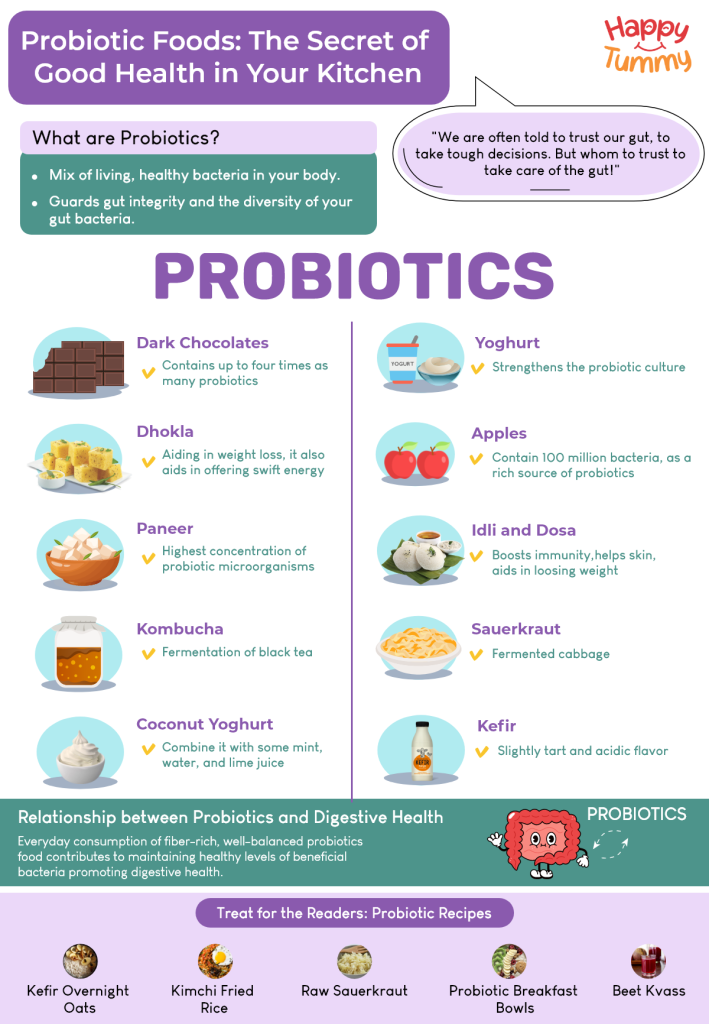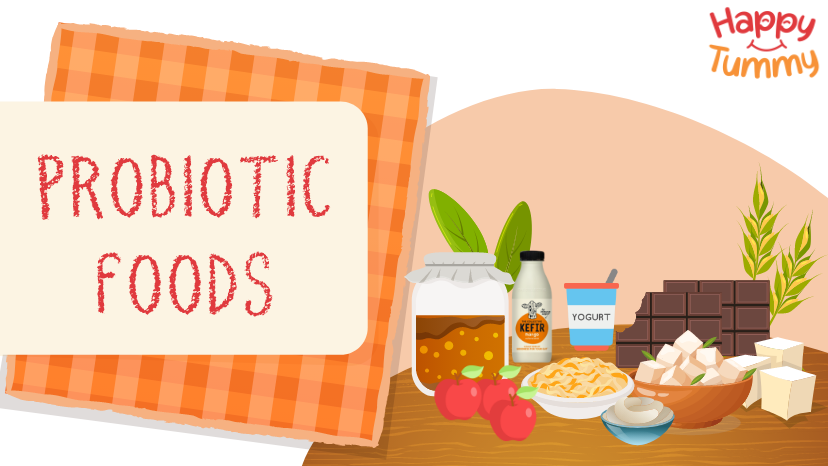Table of Contents
“We are often told to trust our gut, to take tough decisions. But whom to trust to take care of the gut!”
You must have seen and heard about the benefits of good bacteria and told kids various tales to entice them to eat healthily. They are stories intended to encourage kids to eat well, but bacterias are facts. Having healthy bacteria in your stomach and nourishing yourself with those bacteria through specific foods are necessary for maintaining gut health.
It is crucial to consume healthy foods regularly, and don’t worry; doing so is extremely easy.
Probiotics are healthy foods with live bacteria that, when adequately eaten, can provide many health benefits.
Want more motivation to dive in?
Let’s look into the benefits of probiotics for a healthy gut and try to incorporate some delicious recipes into our everyday diets.
What are Probiotics?

Probiotics are a mix of living, healthy bacteria in your body. Typically, bacteria are thought of negatively as something that makes you sick. However, your body constantly contains two types of bacteria: good and bad.
Good bacteria found in probiotics aid in maintaining your body’s health and functionality [1]. You can benefit from this beneficial bacteria in numerous ways, including fighting off harmful bacteria when there are too many and making you feel better.
Do you consume at least a bowl of curd every day?
You should, since it is loaded with gut-friendly bacteria and probiotics that help boost your immunity and digestion. Curd is a simple and everyday example of probiotics. But you must be wondering what probiotics and their role is. Let’s get some facts clear first!
Since the gut controls 70% of immunity, having a healthy gut can boost immunity [2]. A small bowl of probiotic foods with your meal can make your diet complete, wholesome, and nourishing.
It strengthens your ability to remain stable in a constantly changing world and guards gut integrity and the diversity of your gut bacteria.
You can avail of it from supplements and food prepared from natural fermentation.
Excellent sources of probiotic foods include yoghurt, kefir, sauerkraut, tempeh, kimchi, kombucha, pickles, buttermilk, and some types of cheese (cheddar, mozzarella, and gouda).
Are you feeling yummy? No worries, say cheese and get clicked!
Relationship between Probiotics and Digestive Health
Maintaining the proper balance in your body is an essential function of probiotics or good bacteria.
Think of it as sustaining your body’s balance.
Bad bacteria enter your body and multiply while you are ill. Your body becomes out of balance as a result. You feel better because the good bacteria are working to fight off the bad bacteria and restore the balance in your body.
This act of balancing is instinctively taking place in your body constantly.
Simply said, your body naturally contains good bacteria. Everyday consumption of fiber-rich, well-balanced probiotics food contributes to maintaining healthy levels of beneficial bacteria[3].
Probiotics are living microorganisms that offer health benefits to their host. These good bacteria control harmful microorganisms like germs.
When taken in the correct quantity, it aids digestion and enhances nutrient absorption. Probiotics are called ‘live cultures’ or ‘active cultures, ‘ which means fermented products contain probiotics, and bacteria still live in them when you are consuming them.
Sounds good, right?
It’s time to start eating these probiotic foods for optimum health if you want all these advantages. Perhaps you should consume a range of probiotic meals since each provides a unique sort of helpful bacteria to aid the body in various ways.
Skincare and Hair Care with Probiotics
Are you pissed off with your hair fall? Are you over-stressed, as excess stress is directly linked to hair fall?
But probiotics have the solution to both stress and hair care. While calming you down, Probiotics can benefit hair and skin health. Probiotics are known to deal with skin inflammation, which can help reduce scalp inflammation leading to strong and healthy hair follicles.
Probiotics can also reinforce the scalp-skin barrier, increase skin hydration, and enhance skin immunity.
Topical probiotics (creams and ointments) can aid skin barrier function and hair quality and promote the body’s capacity to produce thick, healthy hair.
It’s crucial to remember that the individual probiotic strains used in hair and skin care products might differ, and some may work better than others for particular skin and hair issues. Combining probiotics with other skincare and hair care regimens can increase their benefits [4].
Top Ten Gut-Friendly Probiotics
Most of the time, you may increase your probiotic intake without spending much on pricey pills, powders, or supplements.
Many probiotic foods are available that are tasty, adaptable, and simple to eat as a natural component of a healthy, balanced diet.
Where can you find probiotics? These are the foods that contain this helpful bacteria.
#1 Kefir
Having a distinctive blend of milk and kefir grains that have undergone fermentation, this fermented dairy product has a slightly tart and acidic flavor.
Although it is similar to yogurt, it is fermented with yeast and more bacteria, resulting in a product that is higher in probiotics and lower in lactose, making it a good option for many people who are lactose intolerant.
#2 Sauerkraut
You can make this from fermented cabbage (also known as Khatti Gobhi in Hindi), and other probiotic vegetables containing a wide variety of organic acids, which help the growth of good bacteria. One cup (142 gms) of Sauerkraut has 27 calories.
#3 Kombucha
It is a fermentation of black tea and is a symbiotic colony of bacteria and yeast. Since its inception in Japan, kombucha has existed for over 2,000 years. Its primary health advantages include digestive support, incredible energy, and liver detoxification.
#4 Yoghurt
It is made from milk and contains live and active bacteria. Because homemade yogurt is fermented for at least twenty-four hours, which enables the use of most milk sugars and strengthens the probiotic culture, it is a rich source of probiotics. It strengthens bones because of the calcium content.
#5 Coconut Yoghurt
You can make this by fermenting the juice of fresh coconuts with kefir grains. However, it has several strains that are good for your health.
Coconut kefir has a fantastic flavor, and you can combine it with some mint, water, and lime juice to create a delicious, revitalizing beverage.
#6 Paneer
A great source of probiotics is raw cheese, particularly paneer. On the other hand, processed, cooked, melted cheese kills bacteria.
The cheese made from raw, unpasteurized milk has the highest concentration of probiotic microorganisms. Paneer is crucial for heart, bones, and teeth health.
#7 Dhokla
Gujarat is the origin of the well-known dish called dhokla. Although it was initially native, it is now served in all upscale restaurants and hotels and is known as a delicious and healthy cuisine because of its advantages for health.
It would be best if you make this by combining rice or pulses, yoghurt (Dahi), and fermented gram flour (besan). The food’s probiotic properties result from the fermentation process, which enables the live culture to settle down appropriately for growth.
Yoghurt offers an extra layer of probiotic microorganisms. Dhokla is a popular evening snack that is slightly spicy. In addition to aiding in weight loss, it also aids in offering swift energy.
#8 Idli and Dosa
These are southern India’s traditional dishes. It consists of lentils (urad dal) and fermented hard rice.
The food promotes the formation and development of live cultures of beneficial bacteria because it is low in fat and calories. Idli and Dosa are paired with chutneys and sambar, made from spicy condiments.
These spices are also a great source of digestive microorganisms. Idli and dosa eating provides a variety of health advantages, including boosting the immune system, rejuvenating the skin, easing digestive discomfort, and encouraging weight loss.
#9 Apples
The adage “an apple a day keeps the doctor away” is true. Apples contain 100 million bacteria, making them a rich source of probiotics and nutritional fibers.
Consuming apples produce short-chain fatty acids and creates a favorable pH environment for the development of beneficial bacteria in the gut.
#10 Dark Chocolates
A dairy product rich in probiotics and antioxidants, dark chocolate is both in quality and quantity. Manufacturers treat dark chocolate at low temperatures and add probiotics to it.
Compared to other dairy types, it contains up to four times as many probiotics. For this reason, probiotic chocolate bars are kept in supermarket refrigerators.
Treat for the Readers: Probiotic Recipes
You can use probiotic-rich foods in various mouthwatering recipes in enjoyable and delectable ways. Here are a few illustrations:
- Kefir Overnight Oats: For a beautiful morning treat, combine rolled oats, kefir, fruit, and almonds in a jar and refrigerate overnight.
- Kimchi Fried Rice: To make a hearty and substantial dish, mix cooked rice, kimchi, scrambled eggs, and chopped vegetables in a pan.
- Raw Sauerkraut: To make this tangy, flavorful relish, mix chopped cabbage, salt, and any additional seasonings in a jar and let it ferment for a few days.
- Probiotic Breakfast Bowls: For a delectable and gut-friendly breakfast, mix Greek yoghurt, sauerkraut, avocado, and scallions in a bowl.
- Beet Kvass: You can make this probiotic beverage by combining cooked beets, salt, and water. It is then allowed to settle for a few days.
Misconception About Probiotics
Probiotic food myths can include ideas that all probiotic meals are the same, all probiotic supplements work, and that ingesting a lot of probiotics is always advantageous.
While some supplements may not contain live bacteria or survive the digestive process, not all probiotic foods contain the same strains or quantities of live bacteria. Additionally, it’s crucial to control your probiotic intake and pick foods suitable for your needs and gut health.
If you have any concerns about using probiotic foods or supplements in your diet, speaking with a licensed healthcare professionalIt’s crucial to remember that the individual probiotic strains used in hair and skin care products might differ, and some may work better than others for particular skin and hair issues. Combining probiotics with other skincare and hair care regimens can increase their benefits [5] is a good idea.
Note Down
The simplest strategy to maintain a healthy gut is to eat foods rich in gut microorganisms daily. You may improve your digestion and immunity by consuming these probiotic foods.
These foods are popular and frequently accessible due to their probiotic characteristics. You can use your imagination to create inventive meals[6] employing these probiotic food products, further heightening the excitement.
It’s crucial to remember that everyone has a different gut flora, so what works well for one person may not work well for another. It’s always a good idea to consult a licensed healthcare professional before introducing new probiotic items to your diet.
Remember, consuming probiotic foods in control is vital as part of a balanced diet to support gut health and a happy tummy.
Frequently Asked Questions
Due to their high fiber content, you can include broccoli and other cruciferous vegetables in India’s list of probiotic foods. As a result, it is recommended that you have cruciferous vegetables like cabbage, cauliflower, kale, and Brussels sprouts regularly in your diet.
Always seek the opinion of a trained healthcare professional to learn which probiotic meals and supplements would be best for your requirements and gut health. However, eating fermented foods alone will provide enough probiotics if you maintain a healthy lifestyle and eat a balanced diet.
Prebiotics are fibres that act as food for these healthy bacteria, whereas probiotics are living microbes that have health benefits when taken.
Alcohol is not a probiotic diet since it lacks living microbes that benefit health. Alcoholic drinks like beer, wine, and kombucha may contain beneficial bacteria and yeasts that act as probiotics since fermentation. It would be best to balance any potential advantages of these fermented drinks against any disadvantages, and usage should be moderate. It’s crucial to keep in mind that excessive alcohol use might harm both general and gut health.















